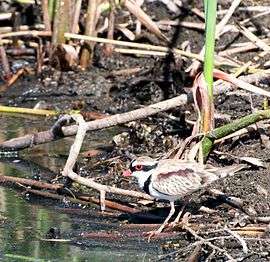Black-fronted dotterel

| Black-fronted dotterel | |
|---|---|
 | |
| Scientific classification | |
| Kingdom: | Animalia |
| Phylum: | Chordata |
| Class: | Aves |
| Order: | Charadriiformes |
| Family: | Charadriidae |
| Genus: | Elseyornis Mathews, 1914 |
| Species: | E. melanops |
| Binomial name | |
| Elseyornis melanops (Vieillot, 1818) | |
The black-fronted dotterel (Elseyornis melanops) is a small, slender plover that is widespread throughout most of Australia, to which it is native, and New Zealand, where it self-introduced in the 1950s.[2]
It is common in freshwater wetlands, around the edges of lakes and billabongs, and in shallow, temporary claypan pools. It is also found occupying saline mudflats and estuaries, but rarely. They are generally sedentary, with a single bird, a pair, or a family group occupying a stretch of habitat on a more or less permanent basis. However, some individuals appear to travel considerable distances, and flocks will sometimes congregate in food-rich areas.
Unlike many other wading birds, black-fronted dotterels retain the same plumage all year round, which makes identification easier. They forage in a series of short running motions, holding the body horizontal, stopping to peck from time to time with a rapid bobbing motion. Their diet consists of mostly insects and other small creatures, supplemented by a few seeds.
Eggs gestation period: 4-5 weeks. up to 3 eggs have been observe on nest. 24 Hours after they hatch chicks leave the nest to hide in less exposed areas, at the same time both parents look after them.
Gallery
- Tamborine, SE Queensland, Australia
 Lake Monger, Western Australia
Lake Monger, Western Australia Northern Territory, Australia
Northern Territory, Australia Black-fronted dotterel on the Cairns esplanade
Black-fronted dotterel on the Cairns esplanade
References
- ↑ BirdLife International (2012). "Elseyornis melanops". IUCN Red List of Threatened Species. Version 2013.2. International Union for Conservation of Nature. Retrieved 26 November 2013.
- ↑ Common Birds in New Zealand ISBN 0-589-00759-9
External links
 Media related to Elseyornis melanops at Wikimedia Commons
Media related to Elseyornis melanops at Wikimedia Commons Data related to Elseyornis melanops at Wikispecies
Data related to Elseyornis melanops at Wikispecies
